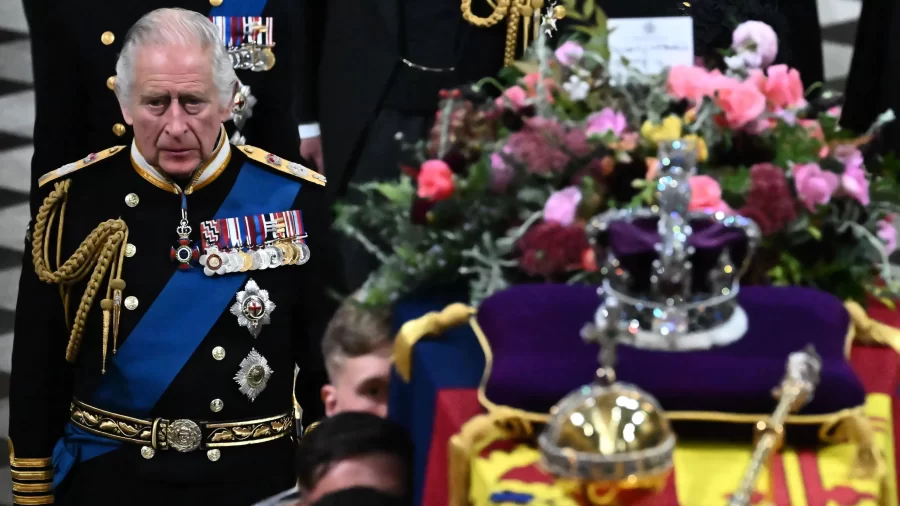The Meaning of the Monarchy
November 11, 2022
The recent death of Queen Elizabeth II, whose 70 years on the throne made her the longest-serving monarch in over 1000 years of British history, has left a significant impact on a country where 80% of the population has no memory of a time before her. With her death, the throne passes to her decidedly less popular son, King Charles III. The shadow cast by the scandal surrounding the dissolution of his first marriage to Diana Spencer, the Princess of Wales, 30 years ago, continues in public opinion, despite his extensive work with charity and dutiful fulfillment of royal duties as the Prince of Wales. The recent fourth season of the hit Netflix drama “The Crown,” which portrays the life of the late Queen and that I reviewed the first two seasons of HERE, went in-depth on their turbulent relationship and reawakened public interest in the couple. As the removal of floral tributes commences, and the UK moves from funeral black into shades of gray, the fond memory of the late Queen shifts towards a critical eye on her successor’s actions. In the turbulent time between reigns, many ask if the monarchy is even suitable in the modern era. As Queen Elizabeth proved, however, the monarchy’s most significant strengths include the value placed on tradition.
When Princess Elizabeth became Queen Elizabeth II in 1952, she was only 25 and remembered a time when the monarchy was in danger of being abolished. Her uncle, Edward VIII, abdicated the throne in 1936 to marry divorced American Wallis Simpson, thrusting her father into the limelight as Head of State. His tenure as King included the dark years of World War II when the British struggled valiantly in the fight against fascism, and their King and Queen took it upon themselves to connect with their suffering people. Then-Princess Elizabeth made a radio broadcast in 1940 to British children worldwide sent away from their homes for protection from air raids. In this audio, her noble British accent, with its clipped sounds and pauses even at her tender age, gives a formal yet comforting speech expressing her sympathies to children stranded in unfamiliar environments, stating peace would soon come for “the children of today.”
In many ways, “formal yet comforting” can sum up her reign; she was always present as an upholder of tradition, which she did out of love for her people.
Uncomplainingly, she did her duty even when it affected her relationships, acting much like her predecessor, Elizabeth I, by carrying a mentality of being “wedded to England.” Many would say her religious devotion to duty was one of the more unwieldy tenets of her philosophy. Still, as her reign progressed and her image shifted to a mother, then a grandmother figure, she worked to strengthen her relationships with her children and build new ones with her grandchildren, prioritizing family over duty in the wake of Diana’s death in 1997.
This decision was not without its critics, as many in the British public felt the Queen was uncaring in refusing to acknowledge the loss. After nearly a week holed up in her Scottish residence Balmoral, where her own death would take place 25 years later, she made the trip down to London to face the country’s feelings. There, she made a speech to the public memorializing the Princess, not as a monarch, but as a grandmother to Diana’s children. Even by referencing her emotions instead of outright stating them, the Queen touched a chord with the British people, and they saw a person behind the regalia.
This rare emotional response is something Charles should look to as a way to modernize his role as King without further degrading his image. He has, through happenstance, already done so by discussing how the Queen’s death affected him as her son. Like the Queen, he didn’t overstate his emotions but hinted at them, causing the public to recognize her death’s personal impact. Though Charles’ tendency to meddle often stirs derisive groans from his subjects, in the coming months, with the British economy’s current crisis set only to get worse, he could shift that desire towards a more soft power. Outright expressing any disapproval of the Prime Minister would be unheard of, but utilizing the weight of his role with a small amount of individualism to complement it would be more impactful than anything Charles could say in words.
In seeing his mother’s legacy, King Charles III has been provided with a roadmap to the role of a modern monarch, which he has pledged to fill, and the people will watch the first months of his reign with the hope that he will keep his promise.



